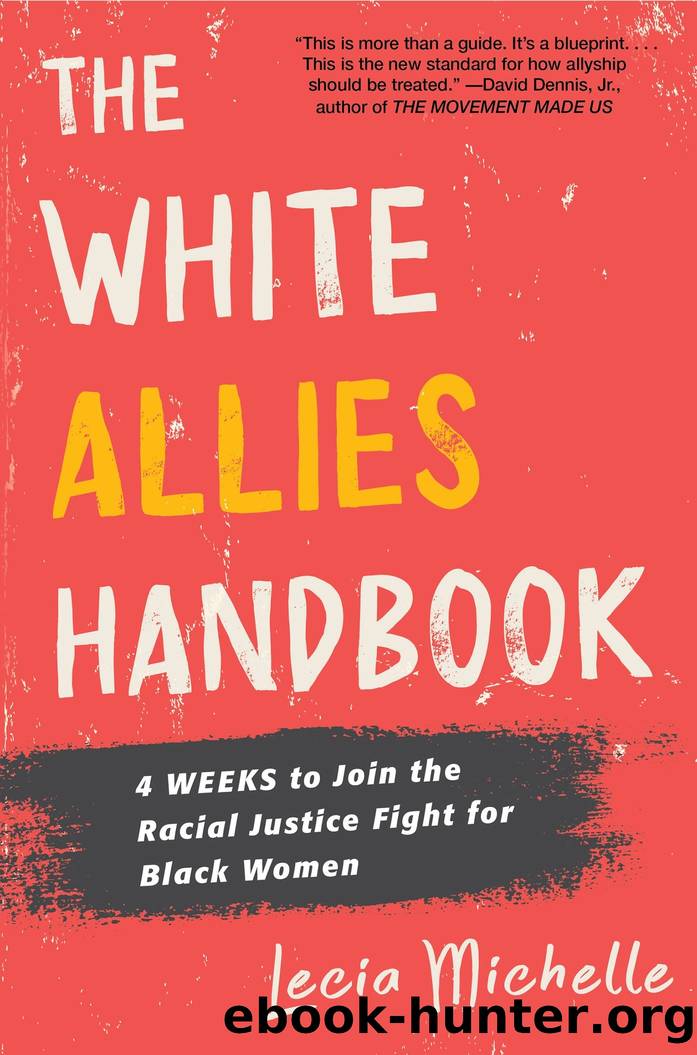The White Allies Handbook by Lecia Michelle

Author:Lecia Michelle [Michelle, Lecia]
Language: eng
Format: epub
Publisher: Kensington Books
Published: 2022-06-08T00:00:00+00:00
By now you should have a solid grasp of what allyship means. Youâre regularly talking to other white allies to learn from their experiences and find additional resources for your library. Now itâs time to use that knowledge to educate white people. Itâs okay to be nervous or scared. Thatâs normal. Remember that your discomfort is a sign of growth. In this chapter, Iâll provide you with some tips you can use before, during, and after these racial justice conversations. These tips can help you have more productive discussions and learn important lessons from these encounters. What makes you most nervous when you think about educating another white person?
Your journal already contains a wealth of information to assist you in educating others. One of the most persuasive tools you can use in these conversations will be your own experiences and insights. Itâs important to talk about your ongoing journey with allyship. Personalizing a discussion by including what youâve learned about yourself and being an ally helps you connect with the other person and begin to form a level of trust. You never want to distance yourself from your own racism when youâre trying to educate other white people. What have you learned so far about your racism? Donât come across like youâre too good to make a mistake or that youâve never made one (weâll discuss perfectionism in Chapter 10). Part of allyship is admitting your own missteps. You also accept that sometimes youâll fail in this role. Sometimes youâll harm us. However, part of educating other white people is telling your own storiesâeven the ones that are uncomfortable or embarrassing to share. How do you feel about opening yourself up in this way? One of the most important lessons you can convey to another white person is how you hold yourself accountable after these failings, learn from them and try to make better decisions in the future.
Another reason I want you always to keep a journal of your conversations and interactions is so you donât forget how you felt or behaved when you were called out on your racism. Itâs important not to forget where you were and how you felt as a new ally. Whatâs the biggest lesson youâve learned about yourself so far? Youâll still experience these feelings years down the road, but youâll have a better idea of how to handle them when they arise. When youâre brand-new to the work, itâs more difficult to rein in those harmful behaviors if youâre feeling attacked. The behavior you exhibited will be the same behavior you try to help other white people overcome. They might feel like youâre picking on them. Theyâll get upset and defensive because, if youâre saying theyâre racist, youâre also saying theyâre a bad person. Calling someone a racist almost always elicits an emotional response from them. They will lash out. When they do, one way to respond is âWe white people are born into a racist, white supremacist environment created by white people. Of course, we will take on racist behaviors and ignore racism right before our eyes.
Download
This site does not store any files on its server. We only index and link to content provided by other sites. Please contact the content providers to delete copyright contents if any and email us, we'll remove relevant links or contents immediately.
The Secret History by Donna Tartt(16658)
The Social Justice Warrior Handbook by Lisa De Pasquale(11494)
Thirteen Reasons Why by Jay Asher(7801)
This Is How You Lose Her by Junot Diaz(5798)
Weapons of Math Destruction by Cathy O'Neil(5046)
Zero to One by Peter Thiel(4834)
The Myth of the Strong Leader by Archie Brown(4795)
Promise Me, Dad by Joe Biden(4455)
Beartown by Fredrik Backman(4433)
Stone's Rules by Roger Stone(4422)
How Democracies Die by Steven Levitsky & Daniel Ziblatt(4413)
The Fire Next Time by James Baldwin(4350)
100 Deadly Skills by Clint Emerson(4085)
A Higher Loyalty: Truth, Lies, and Leadership by James Comey(4039)
Rise and Kill First by Ronen Bergman(4020)
The David Icke Guide to the Global Conspiracy (and how to end it) by David Icke(3891)
The Farm by Tom Rob Smith(3878)
Secrecy World by Jake Bernstein(3788)
The Doomsday Machine by Daniel Ellsberg(3737)
